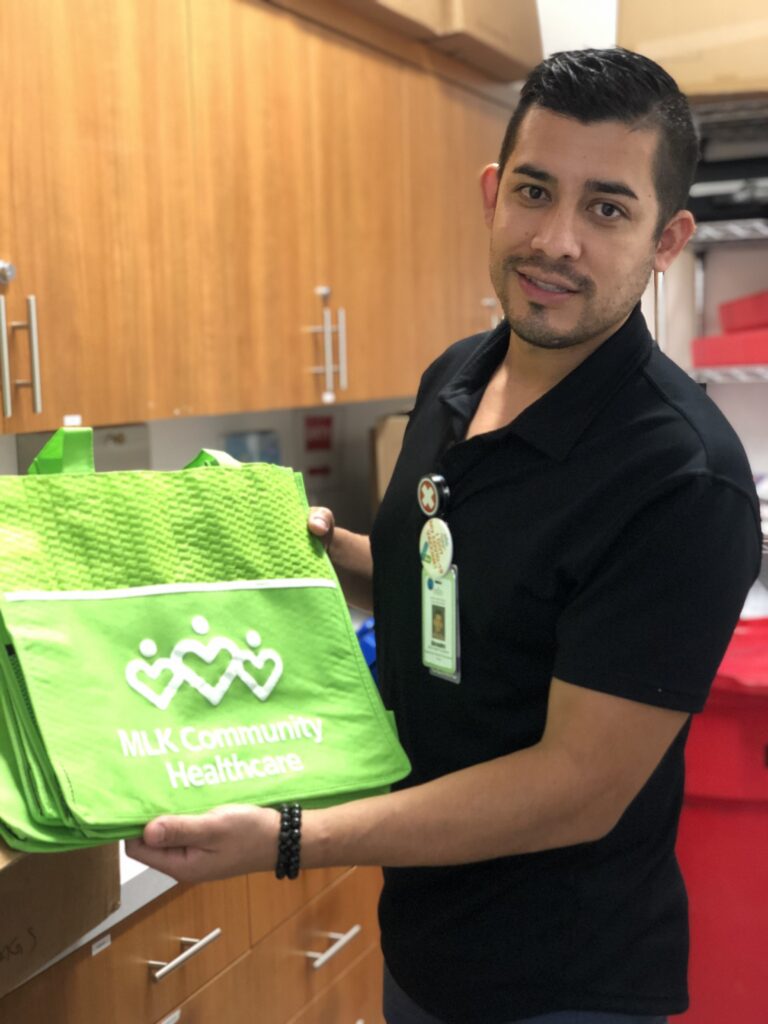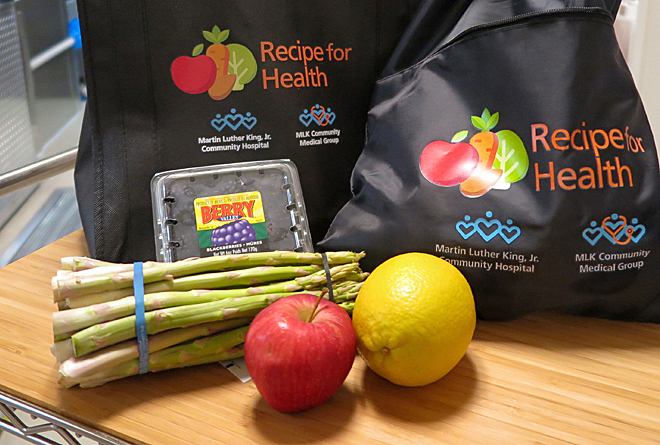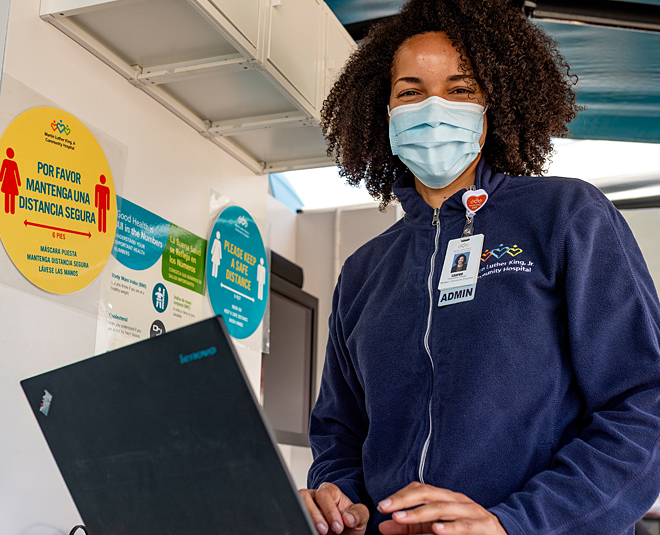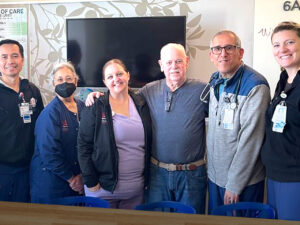Last year before the COVID-19 pandemic peaked, Alex Rivera spent one afternoon every week driving to a local nonprofit organization that provides fruits and vegetables to those experiencing food insecurity. He’d load up his vehicle with fresh produce and drive it all back to work with him.
Alex is a supervisor for social and community services at MLK Community Healthcare’s (MLKCH) medical group, which encompasses three primary and specialty clinics in south Los Angeles, where death from diabetic complications is 72% higher than Los Angeles County as a whole. When he noticed that patients at an MLKCH-provided diabetes class weren’t able to put their lessons from class into practice, he took matters into his own hands (and into his own vehicle) and brought healthier foods to class for the students to take home.

Alex — as well as other dedicated staff members — helped transform a makeshift food pantry into a robust healthy food initiative that serves more than 460 patients in south LA.
The program, called Recipe for Health, helps low-income patients who are living with diabetes, prediabetes, hypertension, heart disease, obesity — and other health conditions such as behavioral health disorders — better understand how to use food as medicine. It combines clinical diagnoses and treatment with healthy eating education and lifestyle improvements.
And it’s already made an incredible impact.
Alex Rivera — as well as other dedicated staff members — helped transform a makeshift food pantry into a robust healthy food initiative that serves more than 460 patients in south LA. Courtesy photo
Serving an underserved community
The emergency department at MLKCH’s hospital sees between 300 and 400 patients per day, and a majority are facing complications from chronic diseases like diabetes and heart disease. Surprisingly, many have no idea that there’s a link between their diagnosis and their diet and lifestyle.
Food insecurity and economic burdens play a major role in the health issues faced by South LA residents. There is an abundance of fast food restaurants — but a lack of healthy grocery stores or food banks. Most families don’t own a car or have access to public transportation, meaning they have no way to get to doctors’ appointments.
Underserved communities like south LA face a host of disadvantages when it comes to health, education, and resources.
Good nutrition is the best prescription
The Recipe for Health program aims to bridge some of those gaps in the community. For most participants, it’s their first time ever receiving this kind of personalized, multi-faceted care. The program empowers them to take control over their own health.
Patients are referred to Recipe for Health in the same way they’d received a prescription for medication. In their initial assessment, they complete a “social determinants of health screening.” That information is considered along with their medical condition and records to make a patient action plan. Ultimately, patients receive a voucher for a weekly healthy food box, tailored to meet their specific health needs.

Although supplemental in-person nutrition classes have been suspended due to the pandemic, patients are still held accountable for their nutrition in other ways. Recipe for Health participants are required to share one wellness thing they did each month — this could include taking an exercise class or watching a cooking video, which MLKCH’s communications team posts online. This encourages the element of wellness, along with nutrition. They’re also required to visit the doctor once a month to check on their progress.
Courtesy photo
Eating healthy: Thinking outside the box
Since the program’s 2019 inception, Recipe for Health patients have shown spectacular improvement. There’s been a decrease in patients’ symptoms and chronic conditions due to the program’s diet and lifestyle changes, and participants and physicians have formed strong bonds within the MLKCH community.

And when it comes to helping patients get the nutrition they need, Recipe for Health leaders sometimes have to get creative. Such was the case with one patient, Mr. Cruz, who had some unique needs. This past summer, a social worker from the medical group reached out to Lauren Espy, manager of community programs at MLKCH, to let her know about a patient who was malnourished and didn’t have the financial stability to be in the program. Additionally, Mr. Cruz had no teeth.
Lauren Espy, manager of community programs at MLK Community Healthcare, leads Recipe for Health, a program that helps low-income patients who are living with chronic illnesses better understand how to use food as medicine. Courtesy photo
The hospital’s food and nutrition services team was able to brainstorm the best option for Mr. Cruz, given his unique needs. The team reached out to Mom’s Meals, an organization that offers medically tailored, home-delivered meals, and together they were able to develop nutritious pureed foods for Mr. Cruz.
What’s next? Let’s keep growing!
This past summer, Recipe for Health began enrolling children ages 5-17. The children also receive weekly fresh produce packages paired with giveaways to help educate them on the importance of nutrition as medicine.
“Kids are also wanting to benefit from the program, and we are constantly thinking of ways we can make this fun for them,” Lauren said. “As we all know, nutrition and wellness have to start young.”
“For kids it’s a little different. For the adults it’s about the conditions they have but for the kids we are looking to enroll those whose parents may have food insecurity,” she said.
Since September, when a pediatrician started at the medical group, enrollment has grown from about 10 kids to 27 kids.
“It takes time for something great to grow,” Alex said. “At MLK, we are determined to create a healthier community and make an impact.”
To learn more about the Recipe for Health program, visit the MLKCH website.
And if you want to learn more about resources for food insecurity in your area, check out MLKCH’s resource bank.


